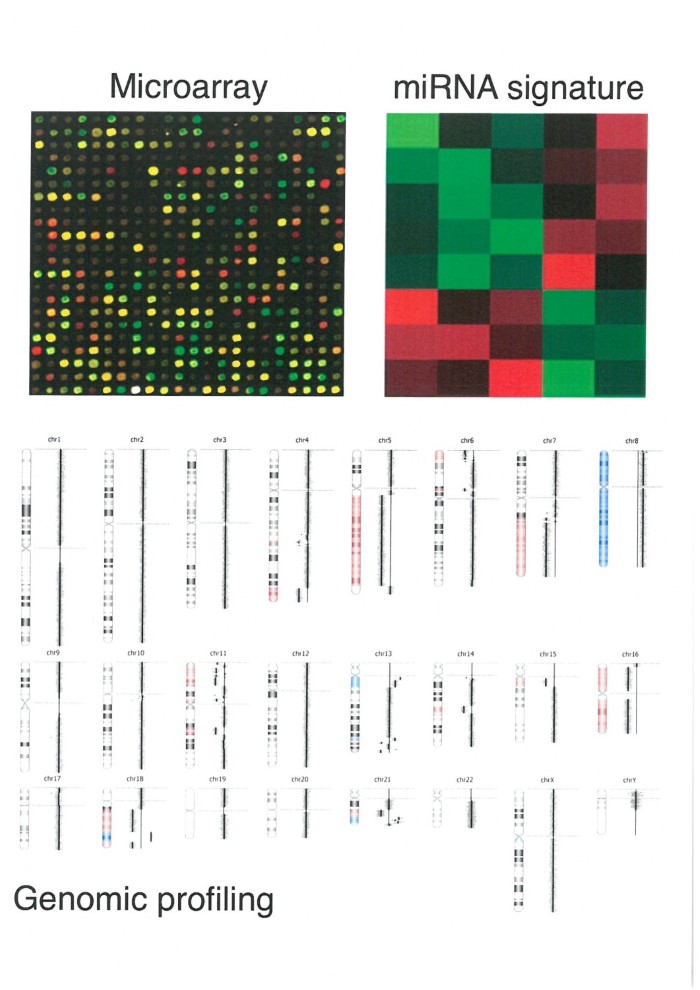Genomic and gene expression profiling in malignant hematology

In the field of genomic and gene expression applications, clinical professor Eigil Kjeldsen has focused his research on the clinical application of different types of microarray assays in cytogenetic diagnostics of malignant hematological diseases.
It is becoming increasingly clear that acquired chromosomal aberrations are very important for diagnostics and especially prognostication of malignant hematological diseases. Chromosomal aberrations, such as translocations, inversions, deletions and amplifications, or various mutations at the nucleotide level may affect gene expression differently. Genomic abnormalities can result in different types of leukemia and malignant lymphoma depending on the specific genes or combinations of genes affected.
The human genome consists of more than 6,000,000,000 base pairs and contains approximately 23,000 protein-coding genes and more than 10,000 non-protein-coding genes (ncRNAs), such as microRNAs and long-noncoding RNAs (lncRNA), it is important to have accurate and reliable high throughput methods to detect chromosomal aberrations and aberrant gene expression. Microarrays are high throughput analyses that have evolved during the past decade enabling examination of all known genes in malignant cells, at the genomic or transcriptional level in a single experiment.
Oligo-based array comparative genomic hybridization analysis (oaCGH) can examine the whole genome for clinically relevant copy number changes, such as amplifications and deletions at the gene resolution level, within three days after receipt of the diagnostic patient sample. We have examined more than 700 patients in a clinical setting utilizing aCGH analysis of patients primarily enrolled in NOPHO or AML17 treatment protocols, in addition to several cancer cell lines. We have shown that oaCGH analysis greatly enhances the diagnostic sensitivity of conventional karyotyping and FISH analyses. Although molecular karyotyping by oaCGH analysis is not commonly used in hematological diagnostic laboratories, we find that it is a highly valuable adjunct to conventional cytogenetics, by its ability to uncover hidden chromosomal aberrations important for treatment and prognosis.
MicroRNAs belong to the class of short ncRNAs, which regulate the expression of other genes. It is known that a single miRNA can regulate the expression of up to several hundred protein-coding genes. Accumulating evidence during the past decade revealed that microRNAs play important roles in controlling cellular functions, including cell differentiation, proliferation, and apoptosis and consequently confers critical roles in the initiation, progression, and relapse of various types of cancers, including different types of leukemia. We investigate the miRNA expression in patients with leukemia to correlate the expression profiles with genomic alterations identified by oaCGH analysis.
The perspective of the current research is to identify personalized genomic and microRNA expression signatures that can potentially be translated into clinical treatment of specific hematological malignant diseases.
Contact details:
Eigil Kjeldsen, M.D.
Clinical professor of CancerCytogenetics
Head of CancerCytogenetics Section
HemoDiagnostic Laboratory
Department of Hematology
Centre for Cancer and Inflammation
Aarhus University Hospital
Tel. +45 4034 4354
e-mail:
eigikjel@rm.dk (hospital)
Eigil.Kjeldsen@clin.au.dk (Aarhus University)